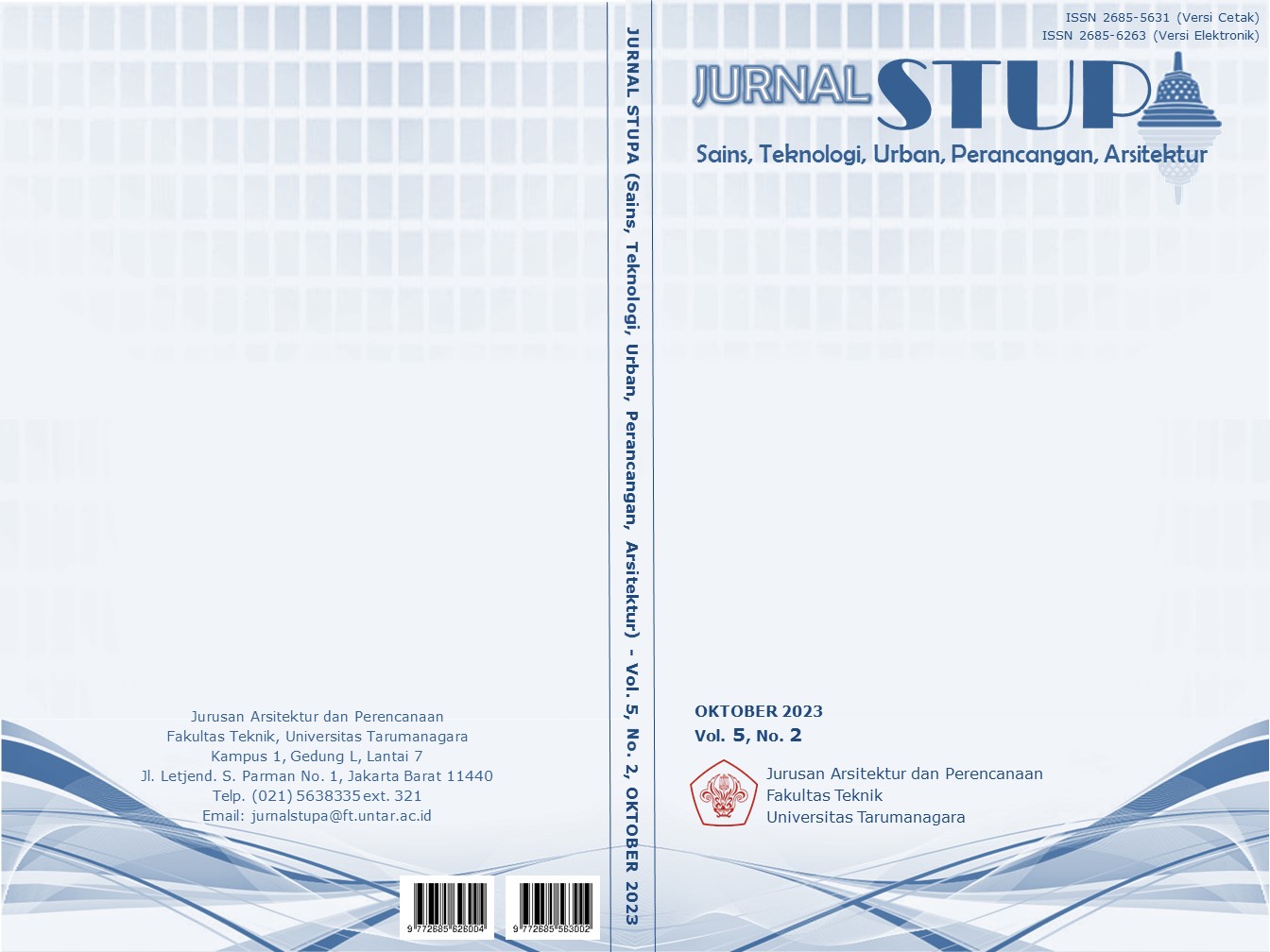KONSEP INTERGENERATIONAL DAN GEROTRANSCENDENCE PADA PERANCANGAN TEMPAT KETIGA BAGI LANSIA PENSIUNAN DI JAKARTA
Isi Artikel Utama
Abstrak
The daily differences between workers and the elderly make it difficult for a retiree to adapt. This can cause the elderly to feel isolated and become stressed. The aging process which has an impact on the physical and psychological condition of an elderly person is also a limitation for the retired elderly to be able to carry out productive activities. Because of these conditions, the elderly are often considered vulnerable and weak, when in fact there are still many elderly who are able and want to do activities productively. The elderly themselves still have social responsibilities towards other generations, whereas an elderly person should guide the next generation based on the experiences they have. Therefore, currently we need a place for the elderly to retire in urban areas to be able to carry out their activities productively and carry out their role as the person in charge of intergeneration. This study uses a qualitative approach, which is obtained based on literacy of urban elderly, intergenerational, and third place architecture, observations and interviews of retired elderly in the Jabodetabek area. The findings obtained are in the form of the role of the elderly in the social life of the community as a syntonist between generations which makes people's lives harmonious. This role makes the elderly have a response in the form of caring or generativity towards the next generation. The existence of an important responsibility towards society makes the elderly feel gerotranscendence, where they can see the aging process as something positive. In daily life, the space used by the elderly is also inaccurate due to collapsed places. This causes adjustments to their own third places. Thus, the resulting program design will have spatial and spatial proximity between the first, second, and third places.
Keywords: elderly; generativity; gerotranscendence; intergenerational; third place
Abstrak
Perbedaan keseharian yang dimiliki oleh seorang pekerja dan lansia mengakibatkan seorang pensiunan terkadang sulit untuk dapat beradaptasi. Hal ini dapat menyebabkan lansia merasa terisolasi dan menjadi stress. Proses penuaan yang berdampak pada kondisi fisik dan psikis seorang lansia juga menjadi sebuah keterbatasan bagi lansia pensiunan untuk dapat beraktivitas secara produktif. Karena kondisi tersebut, sering kali lansia dianggap rentan dan lemah, padahal nyatanya masih banyak lansia yang mampu dan ingin beraktivitas secara produktif. Lansia sendiri masih memiliki tanggung jawab secara sosial terhadap generasi lainnya, dimana seorang lansia harusnya membimbing generasi selanjutnya berdasarkan pengalaman yang mereka miliki. Maka dari itu, saat ini diperlukan sebuah wadah bagi lansia pensiun di area urban untuk dapat beraktivitas secara produktif dan menjalankan perannya sebagai penanggung jawab dari intergenerasi. Penelitian ini menggunakan pendakatan secara kualitatif, yang diperoleh berdasarkan literasi terhadap lansia urban, intergenerasi, dan arsitektur third place, observasi serta wawancara terhadap lansia pensiun di area Jabodetabek. Temuan yang didapatkan berupa peran lansia dalam kehidupan sosial masyarakat sebagai sintonis antar generasi yang membuat kehidupan masyarakat menjadi harmonis. Peran ini membuat lansia memiliki respons berupa kepedulian atau generativity terhadap generasi selanjutnya. Adanya tanggung jawab yang penting terhadap masyarakat membuat lansia merasakan gerotranscendence, di mana mereka dapat melihat proses penuaan sebagai sesuatu yang positif. Dalam kesehariannya, ruang yang digunakan oleh lansia juga sudah tidak akurat karena terjadi collapsed places. Hal ini menyebabkan harus adanya penyesuaian terhadap third places mereka sendiri. Dengan demikian, rancangan program yang dihasilkan akan memiliki kedekatan ruang dan tempat antara tempat pertama, kedua, dan ketiga.
Rincian Artikel

Artikel ini berlisensiCreative Commons Attribution-NonCommercial-ShareAlike 4.0 International License.
This work is licensed under a Jurnal Sains, Teknologi, Urban, Perancangan, Arsitektur/ STUPA Creative Commons Attribution-NonCommercial-ShareAlike 4.0 International LicenseReferensi
Adioetomo, S. M., Howell, F., Mcpherson, A., & Priebe, J. (2014). Social Assistance for the Elderly: The Role of the Asistensi Sosial Lanjut Usia Terlantar Programme in Fighting Old Age Poverty. Jakarta: Tim Nasional Percepatan Penanggulangan Kemiskinan (TNP2K).
Affandi, M. (2012). Faktor-Faktor yang Mempengaruhi Penduduk Lanjut Usia Memilih untuk Bekerja. Journal of Indonesian Applied Economics Vol. 3 No. 2.
Ananta, A. (2012). Financing Indonesia's Ageing Population. Institute of Southeast Asian Studies.
Badan Pusat Statistik. (2019). Statistik Penduduk Lanjut Usia 2019. Jakarta: Badan Pusat Statistik Indonesia.
Badan Pusat Statistik. (2020). Profil Lansia Provinsi DKI Jakarta 2020. Jakarta: Badan Pusat Statistik Indonesia.
Career Research. (2015). Erikson's Theory of Development. Dipetik Mei 8, 2023, dari Career Research: https://career.iresearchnet.com/career-development/eriksons-theory-of-development/
Carp, F. M., Cranz Galen, Wiley, J. A., & Christensen, D. L. (1992). Objective Housing Indicators as Predictors of Subjective Evaluations of Elderly Residents. Journal of Environmental Psychology.
Erikson, E. (1998). Life Cycle Completed. New York: W. W. Norton & Company.
Goode, W. J. (1970). World Revolution and Family Patterns. Washington: The Free Press.
Hodges, S., & Myers, M. (2007). Empathy. Dalam K. D. Vohs, & R. F. Baumeister, Encyclopedia of Social Psychology (hal. 296-298). California: SAGE Publications.
Ickes, W. (2003). Everyday Mind Reading: Understanding What Other People Think and Feel. New York: Prometheus Books.
Littman, D. M. (2021). Third place theory and social work: Considering collapsed places. Journal of Social Work.
Oldenburg, R. (1999). The Great Good Place. Florida: Marlowe & Company.
Robinson, S., Mallgrave, H., Pallasmaa, J., & Gallese, V. (2015). Architecture and Empathy. Finland: Tapio Wirkkala-Rut Bryk Foundation.
Santoso, A., & Lestari, N. B. (2008). Peran Serta Keluarga pada Lansia yang Mengalami Post Power Syndrome. Media Ners, Vol. 2, No. 1, 1-44.
Sarkissian, W., & Stenberg, B. (2013). Guidelines for Planning for Older People in Public Open Space. Nimbin. Diambil kembali dari Sarkissian.
Tornstam, L. (2005). Gerotranscendence. New York: Springer Publishing Company.
Ulfah, S. (2017). Budaya Konsumtif pada Masyarakat Perkotaan menurut Etika Epikuros: Studi Kasus Pengunjung Paris Van Java Mall Bandung.
World Health Organization. (2002). Active Ageing A Policy Framework. Madrid: World Health Organization.



